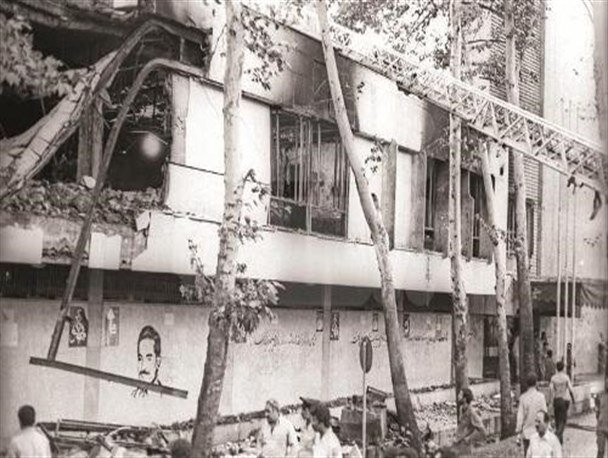By Soheila Zarfam

TEHRAN – Iranians commemorate National Day of Fight against Terrorism on August 30, which is considered a dark day in their country’s history.
On a Sunday afternoon in 1981, only three years after the Islamic Revolution and amidst a full-scale war against Iran by its neighbor Iraq, a terrorist attack sent shockwaves throughout Iran. The country’s President Mohammad Ali Rajai and Prime Minister Mohammad Javad Bahonar were assassinated in an attack on a high-ranking meeting.
The two figures who had dedicated their lives to serving their country were attending a council meeting at the Islamic Republic Party's building, discussing the pressing issues facing the country. Little did they know that a security personnel, entrusted with protecting them, would betray that trust and proceed to assassinate them.
The security man, named Massoud Kashmiri, entered the room with a briefcase that contained a bomb. In an instant, lives were lost, and the two senior officials were killed. The explosion also took the lives of two servicemen and a woman who happened to be passing by the building.
Mujahedin-e-Khalq, a terrorist organization, proudly claimed responsibility for the cowardly attack. They admitted to giving Kashmiri the mission to assassinate the two top officials.
The news of the loss quickly spread across the country. The Tehran Times was one of the outlets that covered the tragedy and the countless reactions to it. According to a report published by the Tehran Times on September 1, hundreds of thousands of people attended the funeral ceremony of Bahonar and Rajai to bid farewell to the two beloved officials.
Iran’s parliament released a statement after the attack urging people to not lose hope and to continue their mission toward full freedom. “Once again people like Banisadr, Bakhtiar, the MKO, and other hypocrites, have used their political and military fronts to undermine the Islamic Revolution. They have used all their powers to shatter the power and firmness of the Islamic republic, but to no avail, for the ship of the revolution is sailing at full speed ahead,” read the statement.
Other officials congratulated the two men’s martyrdom, saying “No power can stain divine light” and that the revolution will continue despite “plots of the enemies”.
“The martyrdom of these two pure sons of Islam took place to show once again the feebleness and the wickedness of terrorism,” said the then Defense Minister Mousa Namjoo.
More than four decades after Bahonar and Rajai’s assassination, the two figures are still regarded as role models for their sincerity, perseverance, enthusiasm, and hard work. That’s while the terror organization responsible for their killing has not been able to take a breather from nonstop misery ever since.
The MKO, which was once on Washington’s list of terrorist organizations, began an unsuccessful quest to find safety soon after the Iran-Iraq war ended.
The terrorists were first relocated from their primary camp, Ashraf, in Iraq’s Diyala Province to Camp Hurriyet, a former U.S. military base in Baghdad, where they lived under constant fear of getting targeted by Iranian forces. They were later sent to another camp in Albania until 2023 when their residence was raided by Albanian police. Some reports suggest the group should be looking for a new shelter as their kingpin, Maryam Rajavi, was banned from entering the Eastern European country and the group was put under investigation by Albania’s judiciary.
It seems that the terrorists who thought they would be able to change the course of Iran’s history by assassinating top figures and killing innocent civilians have finally reached their end.

No comments:
Post a Comment